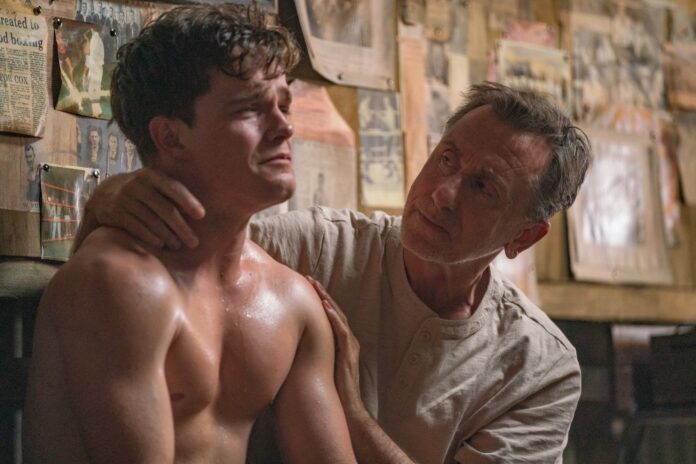
Out gay New Zealand writer/director Welby Ings’ feature film debut, “Punch,” available March 10 on demand and digital, clumsily addresses queer expression and identity, toxic masculinity, and small-town homophobia. Ings shoehorns these topics into a film that has a boxing framework, but he boxes himself into a corner with a dull domestic drama (cue alcoholism and other issues), a rape and revenge subplot, and male teen romance among other topics. It’s a lot, as they say, and Ings does not have the skill to pull it all off successfully. Stylistically, he may include lyrical shots of clouds reflected in a puddle, but more often, he also employs slow-motion sequences that feel too precious.
Jim (Jordan Oosterhof) is a teenager who is training for his first boxing match. He says that boxing gives him focus and he feels “control over [his] every move” in this ring. This is perhaps true, but he is only seen fighting an opponent in the film’s big climactic bout. As for control over his life outside the ring, Jim has a domineering father, Stan (Tim Roth), who is determined for his son to fight and win. Jim has resentment towards his father in part because Stan is an alcoholic who needs to be cared for. When Stan is sober, he exerts considerable control over Jim’s life from monitoring his eating and sleeping to asking him where he has been when he goes out. Stan has his reasons for investing in his son’s success — a big secret he is keeping from his son is eventually revealed for viewers who can’t guess — but this father/son storyline fails to generate much in the way of tension, even when Jim shifts away from his father to another coach for training.
“Punch” also depicts the troubled life of Whetu (out gay Conan Hayes), a Māori teen, who befriends Jim. Whetu is openly gay in the small town, and he is first seen painting his fingernails and being verbally harassed by classmates (more for his sexuality than his race.) He periodically has sex in the public toilets for money and spends most of his time in a shack on the beach he decorated. Whetu’s family life is barely addressed, and when he is kicked out of class for being disruptive, the teacher’s advice “to fit in” goes ignored. Whetu applies makeup, defiantly dresses in provocative clothes, and walks through town in an act of both self-expression and defiance. It leads to an act of homophobic violence where Whetu is beaten, raped, and left unconscious.
As Whetu recovers, Jim becomes more supportive of his friend. This eventually leads to the teens committing an act of revenge that is also tied into Jim’s boxing career, but this episode plot feels like it belongs to a different film.
The scenes of the teens together form the strongest part of “Punch.” Initially, Whetu feels awkward when Jim puts his arm around his shoulders, even though the pair make a cute couple. One of the more salient aspects of the film is that Jim’s sexual identity is never defined. Jim does have a girlfriend, Chelsea (Abigail Laurent), who appears in a few scenes, but Jim cuddles and kisses Whetu more than he does Chelsea.
Ings admirably shows how the more feminine Whetu helps the butch Jim grow and change and become a better person — Jim starts asserting himself when he feels oppressed. But the filmmaker also cudgels viewers with dialogue to get his obvious points across. Jim asks Whetu, “How does it happen that we become something that we’re not?” And Jim expresses his efforts to resist the toxic male culture by telling his father (after Whetu was attacked), “People just pretend it is all rainbow flags and diversity, but it’s not like that here.” Cue eyerolls.
Jim feels guilty for not standing up for Whetu when he was teased earlier, and he overcompensates by caring for (and falling in love with) his injured friend. Jim also tries to build up Whetu’s diminished self-worth by telling his friend that he is beautiful and good before they begin a sexual relationship. Alas, the actors struggle to be very convincing in their roles. Oosterhof is certainly handsome, and Ings finds every excuse to showcase Oosterhof’s fit body — Whetu first spies Jim running and jumping naked on the beach — but the actor’s performance is curiously monotonous. His big emotional moments, which involve either crying or yelling, come off as risible. In contrast, Hayes is less self-conscious as Whetu, but his character is underdeveloped. The film should have focused on Whetu, not Jim, but perhaps Ings was hoping to appeal to straight viewers.
In support, Tim Roth is wasted in a role that requires little of his talents. His appearance here actually is distracting because it is so disappointing.
“Punch” concludes with Jim’s big fight, which also feels underwhelming, although the outcome is oddly satisfying. Likewise, Whetu’s storyline is resolved in a way that does not feel earned, but at least offers some hope. Ings’ film, which is overstuffed and overreaching, puts both the characters and viewers through too much drama and suffering. A tighter focus would have given “Punch” more power.